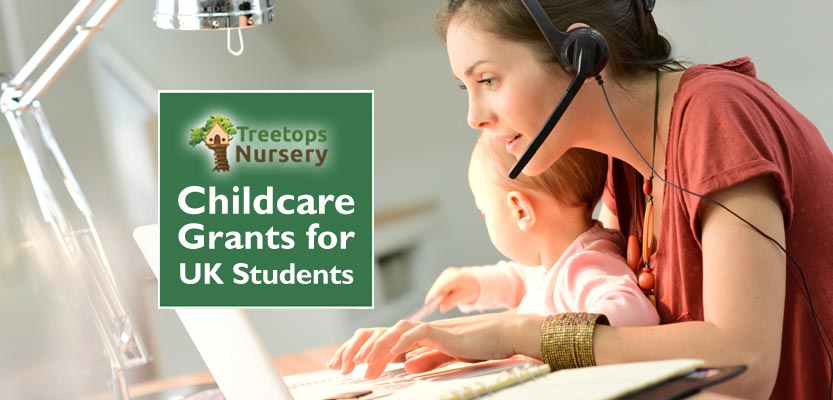
 Are you a parent who wants to continue studying in higher education, but may struggle to afford childcare costs? If so, we have some great news for you. Student Finance England offers eligible students, who are also parents, a generous grant for their child’s childcare. This may allow them to continue with higher education in the knowledge that their child is being looked after by childcare professionals while they study. It can make a real difference, allowing parents to concentrate on studying and potentially increase household income once they graduate their courses.
Are you a parent who wants to continue studying in higher education, but may struggle to afford childcare costs? If so, we have some great news for you. Student Finance England offers eligible students, who are also parents, a generous grant for their child’s childcare. This may allow them to continue with higher education in the knowledge that their child is being looked after by childcare professionals while they study. It can make a real difference, allowing parents to concentrate on studying and potentially increase household income once they graduate their courses.
Today, we’ll take you through the rules around eligibility for the childcare grant and explain how much is available.
The childcare grant for students is in addition to other student finance.
Eligibility Rules for Student Parents
 To be eligible, the following rules apply:
To be eligible, the following rules apply:
- The parent’s child(ren) must be under the age of fifteen, or under seventeen if they have special educational needs.
- The child(ren) concerned must be financially dependent on the applicant.
- The student/parent also has to be eligible for undergraduate student finance based on household income (even if they don’t claim it).
- They can’t already be receiving a postgraduate loan.
- They must be a permanent UK resident.
- They must be studying full time.
- They, or their partner, must not also be claiming Tax-Free Childcare or the childcare element of Working Tax Credit or Universal Credit.
- They or their partner must not be in receipt of childcare funding from the NHS.
A few rules also apply in relation to the childcare provider that receives the funding:
- The childcare provider cannot be related to the applicant or child(ren) if the childcare provision is at home.
- They should be officially recognised in the UK as a childcare provider, i.e. be registered with Ofsted or on the General Childcare Register.
The childcare grant does not need to be paid back.
How Much Do You Get?
 The Childcare Grant for students is worth up to 85% of the cost of your childcare while you’re studying in further education.
The Childcare Grant for students is worth up to 85% of the cost of your childcare while you’re studying in further education.
If you have one child, it can amount to up to £183.75 a week or 85% of your childcare costs if lower. If you have two or more children, then it’s worth up to £315.03 a week or, again, 85% of your childcare costs if that’s lower. You will have to cover the remainder. (Figures are correct for the academic year 2022-23; figures for 2021-22 are £179.62 and £307.95 respectively).
You don’t receive the grant directly; it’s effectively paid to the childcare setting itself (after all, it’s a grant specifically for childcare). Part of the mechanism for payments to the childcare provider is the setting up of a Childcare Grant Payment Service (CCGPS) account. You’ll receive instructions explaining how to set one of these up once your application for the childcare grant has been approved. Then later, Student Finance England sends funds to the account. Once the course has commenced, you will need to approve payments to the childcare provider on a weekly basis. It is then paid directly to them. Should any funds remain once the academic year is complete, this will be returned to Student Finance England.
How You Apply
Applications for Student Childcare Grants are most commonly made online. You apply for a Student Childcare Grant as part of your application for the standard undergraduate student finance (start here).
They can also be made using a paper form if the student finance application has already been made by the time you apply, or in the event that you later claim for an additional child. Once filled in, the paper application can be sent to Student Finance England, PO Box 210, Darlington, DL1 9HJ or alternatively send it to them via your Student Finance Account.
Treetops Nursery Provides High Quality Childcare in Willesden, North West London
 We hope the guide to Childcare Grants for students is useful. If you are a student living or intending to study in North West London, Treetops Nursery can certainly help with your childcare needs while you study. We’re Ofsted registered and are officially a Good Nursery, so your child(ren) will be in good hands. We’re a nursery and pre-school in Willesden, NW10 and are also very near to Harlesden, Kensal Green and Willesden Green. So, we may be very convenient if you are living in Willesden or in North West London, or are studying for an undergraduate course at a college, university, university-linked hospital or other higher education setting in the region — there are many. Please contact us for more details or to apply for a nursery place for your baby or child under five:
We hope the guide to Childcare Grants for students is useful. If you are a student living or intending to study in North West London, Treetops Nursery can certainly help with your childcare needs while you study. We’re Ofsted registered and are officially a Good Nursery, so your child(ren) will be in good hands. We’re a nursery and pre-school in Willesden, NW10 and are also very near to Harlesden, Kensal Green and Willesden Green. So, we may be very convenient if you are living in Willesden or in North West London, or are studying for an undergraduate course at a college, university, university-linked hospital or other higher education setting in the region — there are many. Please contact us for more details or to apply for a nursery place for your baby or child under five:

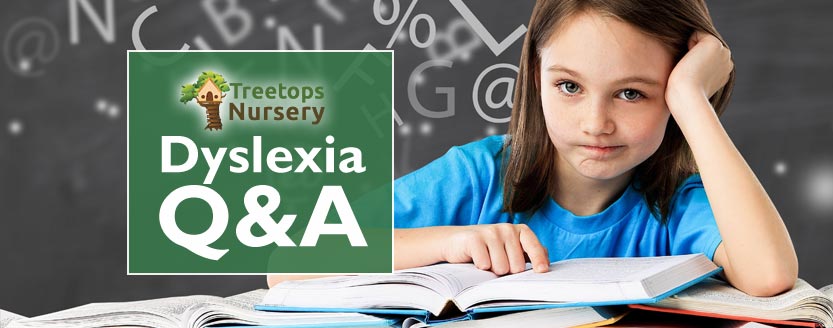
 A: Dyslexia is categorised as a Specific Learning Difficulty (‘SpLD’) in the UK. Most notably, it adversely affects a person’s ability to read because of a general difficulty in learning or interpreting letters, words, and often other symbols. Indeed, it was originally referred to as word blindness. There are other ways dyslexia affects people, though, and we’ll come to those in more detail later.
A: Dyslexia is categorised as a Specific Learning Difficulty (‘SpLD’) in the UK. Most notably, it adversely affects a person’s ability to read because of a general difficulty in learning or interpreting letters, words, and often other symbols. Indeed, it was originally referred to as word blindness. There are other ways dyslexia affects people, though, and we’ll come to those in more detail later. A: As it’s a genetic issue, people are born with the condition. Symptoms may begin to show as a child matures during early learning and beyond. As it is something that’s inherent in their physiology, it is not something people can ‘grow out’ of. It is a lifelong issue. It can be managed, of course, with various approaches available to mitigate its effects as far as possible.
A: As it’s a genetic issue, people are born with the condition. Symptoms may begin to show as a child matures during early learning and beyond. As it is something that’s inherent in their physiology, it is not something people can ‘grow out’ of. It is a lifelong issue. It can be managed, of course, with various approaches available to mitigate its effects as far as possible. They may also have trouble remembering words.
They may also have trouble remembering words. A: Being unable to easily read will hold children back. If they have trouble reading, they will have trouble reading text books for any of the topics at school. Some classroom and test situations will become more stressful for them as a result.
A: Being unable to easily read will hold children back. If they have trouble reading, they will have trouble reading text books for any of the topics at school. Some classroom and test situations will become more stressful for them as a result.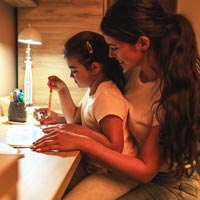 One-to-one help from a teacher, teaching assistant or specialist;
One-to-one help from a teacher, teaching assistant or specialist; A: Childcare professionals will be on the look-out for any signs of possible dyslexia (see the list of possible signs earlier in this article). Parents can do the same and, because the condition is thought to be inherited, this is particularly important if one or more of the child’s parents is dyslexic. Signs can be hard to spot, but the earlier the condition is recognised, the sooner the child can be helped. If any signs of possible dyslexia are suspected, supervising adults and childcare professionals can initially monitor the child’s progress going forwards. They can also assess the child against benchmarks for the same age or peer group in case it’s just a temporary blip in their learning progress.
A: Childcare professionals will be on the look-out for any signs of possible dyslexia (see the list of possible signs earlier in this article). Parents can do the same and, because the condition is thought to be inherited, this is particularly important if one or more of the child’s parents is dyslexic. Signs can be hard to spot, but the earlier the condition is recognised, the sooner the child can be helped. If any signs of possible dyslexia are suspected, supervising adults and childcare professionals can initially monitor the child’s progress going forwards. They can also assess the child against benchmarks for the same age or peer group in case it’s just a temporary blip in their learning progress.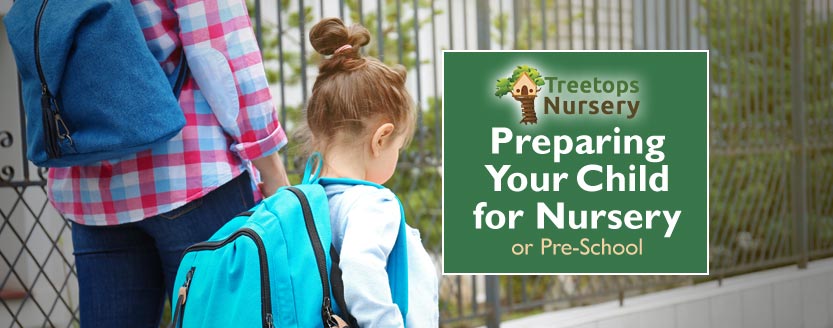
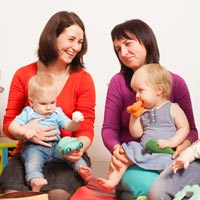 Going from living a life at home with the family to suddenly being thrust into a new environment full of strangers would be daunting enough for anyone. It’s especially true, though, for under-fives starting at nursery or pre-school. So, the key is to prepare children for the change and, of course, for the nursery/pre-school to be very welcoming and accommodating. Here, we’ll take a look at some of the things that will help toddlers and preschoolers transition as smoothly as possible.
Going from living a life at home with the family to suddenly being thrust into a new environment full of strangers would be daunting enough for anyone. It’s especially true, though, for under-fives starting at nursery or pre-school. So, the key is to prepare children for the change and, of course, for the nursery/pre-school to be very welcoming and accommodating. Here, we’ll take a look at some of the things that will help toddlers and preschoolers transition as smoothly as possible.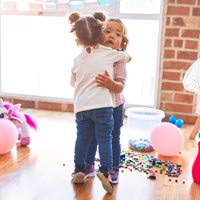 Once you’ve selected
Once you’ve selected  Helping toddlers with toilet training, personal hygiene, speaking, communicating, following rules, tidying up after themselves, hanging up their coat, fastening shoes, packing their backpack and suchlike will also help them with their self-confidence once they start nursery. If they are a little more independent and able when they start, they will naturally also be a little more self-confident and relaxed at the new setting.
Helping toddlers with toilet training, personal hygiene, speaking, communicating, following rules, tidying up after themselves, hanging up their coat, fastening shoes, packing their backpack and suchlike will also help them with their self-confidence once they start nursery. If they are a little more independent and able when they start, they will naturally also be a little more self-confident and relaxed at the new setting.
 Our childcare professionals have many years of childcare experience, so helping children settle in is second nature to us. Rest assured, we will ensure that your child has fun, feels relaxed and is safe at all times. We will ensure that this milestone in their lives goes as smoothly as possible and that their time at the nursery/pre-school is a resounding success.
Our childcare professionals have many years of childcare experience, so helping children settle in is second nature to us. Rest assured, we will ensure that your child has fun, feels relaxed and is safe at all times. We will ensure that this milestone in their lives goes as smoothly as possible and that their time at the nursery/pre-school is a resounding success.

 Willesden and other north-west London areas close by feature regularly in the long-running BBC mystery crime drama Jonathan Creek. This popular series stars actor and comedian Alan Davies as the main protagonist. Other occasional stars who appeared in the series included Griff Rhys Jones, Rik Mayall, Jack Dee (who we’ll hear more about below), Bill Bailey, Nigel Planer and even Bob Monkhouse.
Willesden and other north-west London areas close by feature regularly in the long-running BBC mystery crime drama Jonathan Creek. This popular series stars actor and comedian Alan Davies as the main protagonist. Other occasional stars who appeared in the series included Griff Rhys Jones, Rik Mayall, Jack Dee (who we’ll hear more about below), Bill Bailey, Nigel Planer and even Bob Monkhouse. Actor and dead-pan comedian Jack Dee co-wrote and starred in ‘Lead Balloon’, a BBC4 comedy series that first ran on British TV from 2006 to 2011. The first episode actually achieved the highest ever ratings for a comedy on the channel at the time and the series later aired on BBC2 and to audiences on BBC HD. There were three series in total, with the first two being filmed in and around Willesden. Indeed, the main characters Rick (played by Jack Dee) and his partner Mel (played by Raquel Cassidy) live in a house located in Willesden. A café called ‘Michael’s Café’ in series one and two is, in reality, ‘Gracelands Café’, which is located just a stone’s throw from Willesden in Kensal Green.
Actor and dead-pan comedian Jack Dee co-wrote and starred in ‘Lead Balloon’, a BBC4 comedy series that first ran on British TV from 2006 to 2011. The first episode actually achieved the highest ever ratings for a comedy on the channel at the time and the series later aired on BBC2 and to audiences on BBC HD. There were three series in total, with the first two being filmed in and around Willesden. Indeed, the main characters Rick (played by Jack Dee) and his partner Mel (played by Raquel Cassidy) live in a house located in Willesden. A café called ‘Michael’s Café’ in series one and two is, in reality, ‘Gracelands Café’, which is located just a stone’s throw from Willesden in Kensal Green. Willesden also features in the British TV comedy-drama ‘Minder’ that was extremely popular on ITV/Thames Television from late 1979 through to the mid-90s. One of the two key protagonists, Arthur Daley (played by George Cole), kept a lock-up garage in Willesden and this is where he kept all his merchandise. He also did many of his deals in and around the area. One episode of Minder was even called ‘Willesden Suite’. No less than 10 series aired in total, making George Cole and Dennis Waterman into household names.
Willesden also features in the British TV comedy-drama ‘Minder’ that was extremely popular on ITV/Thames Television from late 1979 through to the mid-90s. One of the two key protagonists, Arthur Daley (played by George Cole), kept a lock-up garage in Willesden and this is where he kept all his merchandise. He also did many of his deals in and around the area. One episode of Minder was even called ‘Willesden Suite’. No less than 10 series aired in total, making George Cole and Dennis Waterman into household names. ‘The Last Detective’ was another extremely popular British TV drama that ran for 4 series between 2003 and 2007. The main protagonist was ‘Dangerous Davies’, a Detective Constable played by Peter Davison. ‘Dangerous Davies’ was, in fact, the series of books upon which the TV drama was based. Filming of episodes often took place in Willesden, Harlesden and other parts of north/north-west London. Indeed, episode 4 (s.3) was called ‘Willesden Confidential’ and episode 3 (s.4) was called ‘A Funny Thing Happened on the Way to Willesden’.
‘The Last Detective’ was another extremely popular British TV drama that ran for 4 series between 2003 and 2007. The main protagonist was ‘Dangerous Davies’, a Detective Constable played by Peter Davison. ‘Dangerous Davies’ was, in fact, the series of books upon which the TV drama was based. Filming of episodes often took place in Willesden, Harlesden and other parts of north/north-west London. Indeed, episode 4 (s.3) was called ‘Willesden Confidential’ and episode 3 (s.4) was called ‘A Funny Thing Happened on the Way to Willesden’. Zomba was widely accepted to be the most successful independent music company (The Zomba Music Corporation sold for literally billions eventually). Along the way, Zomba bought legendary music company Rough Trade and itself eventually became owned by BMG, then later Sony Music Entertainment under the RCA/Jive Label Group umbrella and later still its artists moved across to Epic Records. One of the original founders of Zomba is a certain Mutt Lange, who became a legendary producer (later marrying Shania Twain) who has worked with Def Leppard, The Boomtown Rats, Huey Lewis and the News, Britney Spears, Nickelback, Maroon 5, Bryan Adams, Celine Dion, The Corrs, Billy Ocean, Lady Gaga, Muse, AC/DC, Foreigner, Tina Turner, Backstreet Boys, The Cars and many more. Music genres cover everything from rap and hip-hop to pop and rock. From humble beginnings, this Willesden company influenced music and culture around the entire world.
Zomba was widely accepted to be the most successful independent music company (The Zomba Music Corporation sold for literally billions eventually). Along the way, Zomba bought legendary music company Rough Trade and itself eventually became owned by BMG, then later Sony Music Entertainment under the RCA/Jive Label Group umbrella and later still its artists moved across to Epic Records. One of the original founders of Zomba is a certain Mutt Lange, who became a legendary producer (later marrying Shania Twain) who has worked with Def Leppard, The Boomtown Rats, Huey Lewis and the News, Britney Spears, Nickelback, Maroon 5, Bryan Adams, Celine Dion, The Corrs, Billy Ocean, Lady Gaga, Muse, AC/DC, Foreigner, Tina Turner, Backstreet Boys, The Cars and many more. Music genres cover everything from rap and hip-hop to pop and rock. From humble beginnings, this Willesden company influenced music and culture around the entire world. ‘Morgan Studios’ was another very influential and successful music company that started life in Willesden, pre-dating Zomba, back in the 1960s. They went on to work with huge names like Free, Blind Faith, Led Zeppelin, Supertramp, Paul McCartney, Wings, Rod Stewart, Yes, Black Sabbath, Jethro Tull, Cat Stevens, Pink Floyd, Carly Simon, Alice Cooper, Lou Reed, The Who, The Jam, The Cure, The Stone Roses, Thin Lizzy, The Kinks (more about them below), Squeeze, Gary Moore, Peter Gabriel, Bonnie Tyler, Elton John, and many more household names. The recording studios were based at 169-171 High Road, Willesden, being owned originally by Barry Morgan, the drummer in successful bands like ‘Blue Mink’ and others. Interestingly, in 1980, Morgan Studios were sold half to Zomba (see above) and half to Robin Millar CBE who, four years later, produced the seminal album ‘Diamond Life’ by Sade. He is also a legendary music executive, who worked with many other huge names including Eric Clapton, Sting, Herbie Hancock, Elvis Costello, Bruce Hornsby, Malcolm McLaren and Alison Moyet to name just a few.
‘Morgan Studios’ was another very influential and successful music company that started life in Willesden, pre-dating Zomba, back in the 1960s. They went on to work with huge names like Free, Blind Faith, Led Zeppelin, Supertramp, Paul McCartney, Wings, Rod Stewart, Yes, Black Sabbath, Jethro Tull, Cat Stevens, Pink Floyd, Carly Simon, Alice Cooper, Lou Reed, The Who, The Jam, The Cure, The Stone Roses, Thin Lizzy, The Kinks (more about them below), Squeeze, Gary Moore, Peter Gabriel, Bonnie Tyler, Elton John, and many more household names. The recording studios were based at 169-171 High Road, Willesden, being owned originally by Barry Morgan, the drummer in successful bands like ‘Blue Mink’ and others. Interestingly, in 1980, Morgan Studios were sold half to Zomba (see above) and half to Robin Millar CBE who, four years later, produced the seminal album ‘Diamond Life’ by Sade. He is also a legendary music executive, who worked with many other huge names including Eric Clapton, Sting, Herbie Hancock, Elvis Costello, Bruce Hornsby, Malcolm McLaren and Alison Moyet to name just a few.
